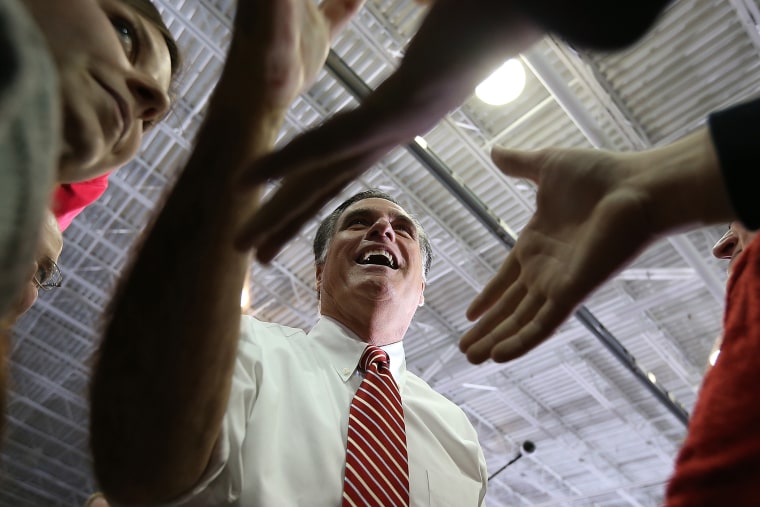There’s a moment in Mitt where the man who could be president finds a wrinkle in his cuff and begins to iron it while it’s still around his wrist.
“Ouch!...It’s working….Ouch! …It’s working…Ouch,” he says as he taps the iron against his cuff.
He could have been narrating his campaign. The first debate? It’s working. The leaked 47% remark? Ouch.
The moment, and Romney’s decade-long quest to lead the free world, ultimately begs just one question: Why did he bother to run?
The film lacks what the campaign did: it’s unclear why—ambition aside—Romney is willing to subject himself and his family to this brutal, decade-long journey. His drive remains enigmatic, hidden behind mentions of duty to country and God. The film is almost completely devoid of actual discussion of Romney’s policy plans or hopes for change. Instead, there are vague references to a poor economy, struggling small business, and taxes.
"Mitt"—a Netflix original documentary that premieres on Friday—is an intimate, humanizing look at the man who nearly became president and the burdens of a modern presidential campaign on a family.
It shows Romney as a deeply religious, thoughtful man with a devoted wife and family; it shows a neat freak, who is constantly picking up trash. (“I could have made a 90 minute film of Mitt turning off hotel lights and picking up trash,” says filmmaker Greg Whiteley.) It portrays a humbler and more self-aware Romney. It’s the kind of image that could have helped Romney in 2012, but his campaign struggled to portray.
It’s a political film that’s completely devoid of policy and politics.
“I thought the heart of the movie would be the campaign strategies in the back room. The machinations of the campaign, the evolution of strategy and message,” Whiteley told reporters on Wednesday, but found himself black-listed by campaign staff who wouldn’t allow him to film their discussions. They saw the cameras as a liability, Whiteley said.
The family, however, was game to go on camera—with the understanding that none of the footage would be released until Romney had either lost or retired from public office. And like the ironing episode, it clearly hurts: Mitt’s family struggles through these campaigns, regularly looking as though they’ve been sucker-punched.
“I believe I have a much stronger film, at the very least it’s a film that’s unique,” Whiteley says.
Whiteley rejected the idea that it wasn’t clear why Romney wants so badly to win, citing a handful of scenes where Romney describes his history turning businesses around in the private sector or a small business owner who feels overburdened by taxes.
“That’s where Mitt’s heart lies, at least that’s why he thinks he’d like to run the country,” Whiteley said.
But amid the lack of policy, it’s the Romney clan’s humanity that shines through in the film.
Ann is the family’s fierce defender; her marriage and partnership with Mitt offers some of the movies most compelling moments. Josh Romney’s blunt, wide-eyed explanation of how hard it was to campaign is one of the most sympathetic, emotional moments of the movie.
“But, for goodness’ sakes, I mean here’s a brilliant guy who’s had his experience turning things around, which is what we need in this country. I mean, it’s like, this is the guy for the moment. And we’re in this and you just get beat up constantly….Oh, Mitt Romney is a flip-flopper. He’s this, he’s that. And it’s [you] kinda go, ‘Man, is this worth it?'…This is awful,” he says.
Unlike the candidate himself, the family’s motivations—love and steadfast faith in dad—are clear.
